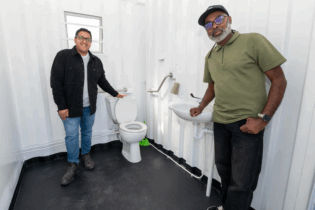Business owners need to ensure that their workspaces are properly cleaned and thoroughly cleansed before employees report for duty once the lockdown has been lifted.
That’s according to specialist cleaning service provider Fidelity Cleaning Services. “It is expected that large numbers of workers will be able to return to work, but it is critical to ensure that their workspaces are properly cleansed and that hygiene measures are kept at the highest possible level to prevent the possible transmission of the coronavirus,” says Fidelity Services Group CEO, Wahl Bartmann. Fidelity Cleaning Services is a member of the Fidelity Services Group. Efforts are continuing around the world to find a cure for the coronavirus. While these efforts continue, Bartmann encourages business owners and employees to make good personal hygiene habits part of their daily lives especially if they are back at work. “The virus is spread when someone who has COVID-19 coughs of exhales. Droplets of infected fluids can land on any nearby surface and objects, which makes regular and thorough cleaning and disinfecting more important than ever before,” says Bartmann. The World Health Organisation and the Centres for Disease Control and Prevention have both released valuable advice on how employers and employees can take steps to control and prevent the spread of the virus at the workplace. “Our efforts to assist our customers across the country are based on these guidelines and on the advice provided by local health authorities in South Africa. Social distancing measures should also be part of this for the foreseeable future,” says Bartmann.At the workplace, employers should ensure:
- Make sure your workplaces are clean and hygienic – Surfaces that are touched regularly (such as door handles, desks, tables, phones and keyboards) need to be wiped down and disinfected regularly
- Promote regular and thorough hand-washing by employees, contractors, and customers – Put sanitising hand rub dispensers in prominent places around the workplace. Make sure these dispensers are regularly refilled
- Display posters promoting hand-washing – Informational and educational posters can be downloaded from a number of websites, such as the South African Government and the CDC. Combine this with other communication measures such as offering guidance from occupational health and safety officers, briefings at internal meetings, and information on intranet sites to promote hand-washing
- Ensure that face masks or paper tissues are available at your workplaces, for those who develop a runny nose or cough at work, along with closed bins for hygienically disposing of them
- Encourage video conferencing or conference calls – While the country works to spread the further spread of the coronavirus, it is better to avoid contact meetings if this is at all feasible
- Hope for the best, but plan for the worst – Ensure that you have accurate contact details for any employee or visitor on hand, so that everyone could be contacted in case of an infection that occurs to anyone that visited your workplace. Allocate a room or a space where anyone that possibly thinks they have fallen ill, can be kept isolated until they can safely be transported for medical treatment if this becomes necessary
He explains the basic cleaning and disinfecting tips that companies and business owners should follow:
Clean surfaces using soap and water Practice routine cleaning of frequently touched surfaces. High touch surfaces include tables, doorknobs, light switches, countertops, handles, desks, phones, keyboards, toilets, faucets, sinks, etc. Once the area has been cleaned, use a disinfectantFollow the instructions
Carefully follow the instructions of the cleaning and disinfecting products you use, as some products encourage that surfaces remain wet for a period of time before it is dried Disinfectant products Disinfectant products with an alcohol content of at least 70% is recommended Clean the surface using soap and water For soft surfaces such as carpeted floor, rugs, and drapes, clean the surface using soap and water or with cleaners appropriate for use on these surfaces. Launder items (if possible) according to the manufacturer’s instructions. Use the warmest appropriate water setting and dry items completely Electronics For electronics, such as tablets, touch screens, keyboards, and remote controls, consider putting a wipeable cover on electronics Clothing For clothing, towels, linens and other items – launder items according to the manufacturer’s instructions. Use the warmest appropriate water setting and dry items completely. Wear disposable gloves when handling dirty laundry from a person who is sick “My advice to any business owner is to make sure they have put the best possible measures in place to protect employees and customers. If you have any doubt about the measures you have taken, get in contact with your local health authority. “It is also important to stay appraised of government’s latest announcements and regulations issued in the fight against the coronavirus,” says Bartmann






